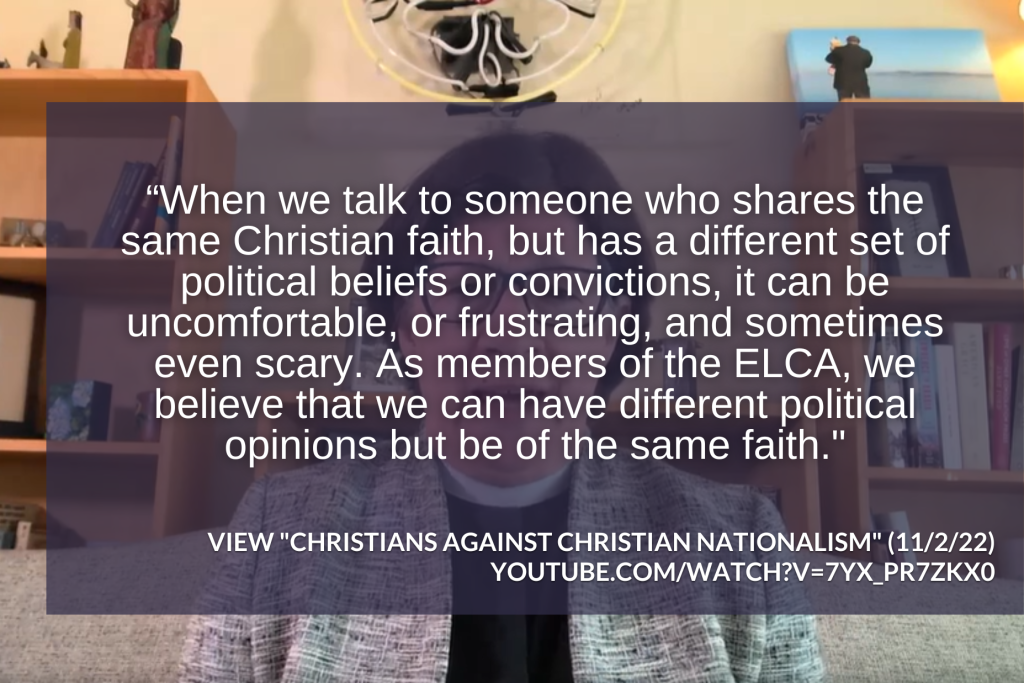By Kayla Zopfi, ELCA Hunger Advocacy Fellow[about the author]
“When we talk to someone who shares the same Christian faith, but has a different set of political beliefs or convictions, it can be uncomfortable, or frustrating, and sometimes even scary. As members of the ELCA, we believe that we can have different political opinions but be of the same faith,” asserts Presiding Bishop Elizabeth Eaton in her November 2, 2022 video addressing Christian Nationalism.
Bringing people together because of, rather than despite, political differences has been a successful value nurtured in many congregations and synods, as well as by us as individuals. “It feels like progress is being made, like seeds are being planted,” said Marilyn Berberich, a leader with the Interfaith Center of Greater Philadelphia, after trying Braver Angels tools that help facilitate depolarizing conversations. “It made me realize how much I assumed about others,” she reflected, which prompted her to volunteer as a “Red leader” in the parlance of the organization.
As the United States continues to grapple with accelerating polarization, and the ELCA navigates being a multipartisan denomination, we can play a role in coming together to create spaces that center us in our common identity as followers of Christ, and build up our resistance to that which may divide us.
Sharing stories based on important themes and experiences from within our faith communities, an ELCA Advocacy Cafe took on the question, “Can Talking Politics Be Healthy”. Silas Kulkarni, ELCA Director of Strategy and Advocacy and former Senior Fellow and Chief of Staff for the Braver Angels Debate and Public Discourse Program, brought together diverse presenters to help envision the role that every individual can play in the work of depolarization.
“We need reconcilers,” stated the Rt. Rev. Mark Beckwith, Episcopal Diocese of Newark bishop, during Advocacy Cafe. Centered in Matthew 5, Bishop Beckwith said healthy conversations across divides are important “not to move people from one side to another, but to find common ground” and “honor the differences we have.
Local, faith-centered approaches to having healthy conversations across divides were described by participants. Some tools from Braver Angels include:
- Engage in cross-partisan 1:1 conversations
- Plug into your local Braver Angels Alliance
- Register for an educational workshop
“Many congregations already face enough friction in their life together without looking for more, particularly in the fraught arenas of public policy and politics,” wrote the Rev. Amy Reumann, Senior Director, ELCA Witness in Society, in The Forgotten Luther: Reclaiming the Social-Economic Dimension of the Reformation. “As the essays in this volume show, Luther lived and taught a living and lively faith that inspires and enables us to respond to God’s grace by moving us from our private lives into the public square for the well-being of our neighbor.”
I’m drawn to the prayer of St. Francis of Assisi: “Lord make me an instrument of your peace.” Depolarization is hard and holy work. Consider joining, or even creating, these conversation spaces in your community.
ABOUT THE AUTHOR:
Kayla Zopfi(she/they) is a Hunger Advocacy Fellow with the ELCA Witness in Society team, passionate about the intersection of faith and the policy. Zopfi is a 2021 graduate of Concordia College, Moorhead, where they studied Religion, Political Science, and Interfaith Studies.

